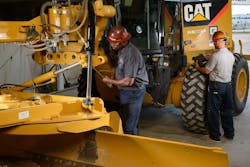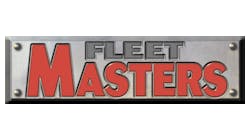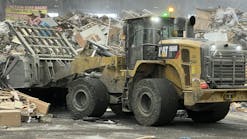Worldwide contractor Bechtel is huge and so is its commitment to fleet management through Bechtel Equipment Operations—but what may be most impressive is how it maintains a focus on customer service.
In Bechtel Equipment’s case, the definition of customer is two-fold. There are Bechtel’s five global business units (Power; Oil, Gas & Chemicals; Civil; Mining and Metals; and Government Services), but also the owners of the projects it serves around the world.
“Currently, we have approximately 70 percent of our fleet offshore,” says Bob Hall, Bechtel Equipment’s director of operations. “Unlike many other U.S.-based fleet guys, we move our equipment around the world much more.”
Bechtel Equipment Operations is one of two winners of the 2013 Fleet Masters Award (Manatee County Fleet Services is the other). The award is presented each year by Construction Equipment and the Association of Equipment Management Professionals (AEMP), and is judged on categories such as finance (financial management, acquisition, warranty and performance guarantees); information management (benchmarking, life-cycle costing, specifications and technology); policies (safety, employee training, environmental and human resources); and controls (outsourcing, parts management, preventive maintenance, and shop and facilities management).
Bechtel Equipment looks after some 5,000 pieces of equipment, 3,500 of which are powered. And that doesn’t count rentals and client-managed fleets. “In any one day, in addition to our Bechtel-owned fleet, we have a couple of thousand pieces of rented equipment and client fleet that we’re managing,” Hall says.
With so much equipment in so many far-flung locations, it’s not only a challenge to keep track of the iron, but also of the customer needs.
“We are subject to a whole different set of rules as we move from country to country,” Hall says. “But our philosophy is driven by our customer requirements, which is part of the uniqueness of our operation. We’re very much customer focused around those requirements that are driven by our customer groups; they all differ significantly.”
Then there are the different cultures, languages and emissions requirements.
“We’re very project-centric to help and support the individual construction teams on each job,” says Ken Burke, CEM and service operations manager for Bechtel Equipment. “What we typically do when we’re procuring our fleet is try to purchase the gear in such a manner that it can go from country to country and region to region and meet the applicable government regulations and ideally have the ability to repatriate that equipment to the U.S.”
With the onset of Tier 4 engines, it’s become a bit more difficult for Bechtel to achieve that mobility.
“There’s an enhanced challenge on maximizing utilization of the fleet, based upon the varying tier requirements around the world, particularly where we’re operating, the likes of west Africa, or certain countries in South America, as well as Asia, where there aren’t the same restrictions as the states,” Hall says. “There’s sometimes an inability to ship in either direction, to bring the Tier 3s back here, or send the Tier 4s to work them in west Africa.”
The different countries, emissions requirements and fuel qualities force Bechtel Equipment Operations to ask questions with every move.
“Each time after you get the piece of equipment from ‘A’ to ‘B,’ we ask if it has another project life left in it, and then you’re left with the question ‘Can we utilize that in that country?’” Hall says.
Also, annual customer surveys are sent to projects to evaluate how Bechtel Equipment is doing. Surveys go to both the global business units and project management in whichever country Bechtel is working.
“We send out surveys to our project customers and the managers of the respective business units soliciting their comments relative to our performance,” Hall says. “Most recently, those results have been very favorable. The comments from the data might present opportunities for improvement; we try then to develop those within the context of the overall company.”
Being project-centric and treating each project like a small business unto itself, complete with profit-and-loss statements, means that Equipment Operations has to be aware of the balance between what’s good for the project and what’s the best practice for Bechtel as a whole.
“There’s a balancing act between the project, the fiduciary responsibility, and the stewardship to handle the assets,” Hall says.
When Hall talks assets, he’s talking about everything on a project from a hammer to scaffolding to a 600-ton crane.
Burke notes one survey example from a few years back, when the company’s large crawler cranes were experiencing a rash of computer breakdowns that lowered their availability to less than 80 percent. Working with the project site, Bechtel Equipment acquired back-ups and implemented a rebuild program to hike crawler crane availability to more than 98 percent. This was all done without replacing the large crawler fleet.
Environmental concerns are yet another customer touch point. Bechtel Equipment’s environmental program falls in line with Bechtel corporate’s environmental, safety and health requirements and procedures. Each project and operating center draws upon the Bechtel centralized program and tailors the program to meet or exceed the local regulations and laws.
“What we strive to do in all of the different areas we execute in, is meet, and/or exceed, all the local regulations,” Burke says.
“All projects are subject to a sustainability development review prior to Bechtel agreeing to bid a job,” Hall says. “During the review, we say ‘Will we build this?’ And, we ask ‘Is there a sustainable development?’ meaning, are we cognizant of the environmental impact? Also, are we cognizant of the training and the learning requirements of this area? Is this project the right type of thing?”
Not every project is right for Bechtel, much like the fact that not every Bechtel procedure and philosophy will fit a smaller contractor’s operation. What advice does this large, global operation have for the smaller contractor?
“Listen to your customers, understand their needs, make sure your goals are aligned, and stay focused on them,” Hall says. “The one business imperative that drives us is one word: utilization. We approach it in two contexts. One, utilization, which might be better characterized as deployment of the fleet, which would be a measurement typical if you run the equipment group like a business or like a rental company. The measurement is tracked by dollars and units.
“That’s deployment of the fleet—to maximize that from a business perspective,” Hall continues. “The second would be to put on your contractor hat and to maximize the utilization of the fleet on site, meaning the physical utilization from a contractor’s perspective, to where, as I sometimes say it, on Monday, we’re the rental company, we’d like everything to be rented, and on Tuesday, we’re the contractor, and we’d like everything off the job.”
Here’s service operations manager Burke’s advice: “From my perspective it’s leveraging technology, focusing on safety and quality of the fleet, and ensuring that the construction equipment management team is hand-in-hand with their client to make sure that you’ve got a win-win scenario, i.e. that whatever you do as a construction group, you’re in full support of what your client needs, wants and desires.”





